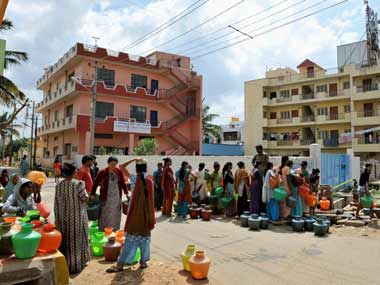“The Government of Karnataka will have to evacuate half of Bangalore in the next ten years, due to water scarcity, contamination of water and diseases.” It is an ominous prophecy from V Balasubramanian, the former Additional Chief Secretary of Karnataka and Chairman, Centre for Policies and Practices, who conducted an elaborate study of the water woes of the state capital. Bangaloreans would do well not to dismiss Balasubramanian’s peep into the future as an exaggeration of a worried mind. It is corroborated by the lab results at the Public Health Institute, and the Department of Mines and Geology of the Karnataka government. The results reveal that 52 per cent of the borewell water, and 59 per cent of tap water in Bangalore, is not potable and contain 8.4 per cent and 19 per cent E.coli bacteria respectively. The reason: the groundwater in at least half of Bangalore is contaminated with sewage water. In 1790, a British captain had described Bangalore as the land of a thousand lakes. Today less than 200 of those 1000 lakes remain and are no more than sewage tanks. The sewage water contaminates the ground water and percolates into the borewells. [caption id=“attachment_697652” align=“alignleft” width=“380”]  Bangalore’s water woes may only get worse with time. AFP[/caption] For those wondering where the 800-odd lakes disappeared, one just has to drive around Bangalore to say, JP Nagar 4th Phase, which was in fact the Sarakki Agrahara lake. Or to the Kanteerava stadium where the Sampangi lake once existed. Or Banakshankari 2nd stage (Kadirenahalli lake), Kempegowda bus terminal (Dharmabudhi lake), National Dairy Research institute (Koramangala lake), HSR Layout (Parangipalya lake) and more. You are unlikely to find any epitaphs to what was clearly a better city to live in. “The 850 km of storm water drains meant to carry surplus water from higher elevation lakes to lower levels in a cascading system of natural rainwater harvesting, now instead carry the city’s sewage into these existing so-called lakes,” said Balasubramanian. “Only 30 per cent of the sewage is treated by the sewage treatment plants and the rest flows into the existing lakes,” he said. Travel in any direction in the suburbs in Bangalore and all you can see is construction activity. Your picture of a beautiful life cracks the moment you enquire about the water supply in an area from those already living there. The city’s population rose from 53 lakh in 2001 to 87 lakh in 2011 and at the present rate of growth, is likely to touch one crore by 2016. Unfortunately the amount of water in the Cauvery hasn’t increased by the same proportions. It would help if those in charge of supplying water to Bangalore would also care to plug the leaks in water supply. An estimated 35 percent of water meant for the city is wasted in leakages. This means of the 1400 million litres per day (MLD) that Bangalore draws, nearly 500 MLD is lost as leakage, and with 150 MLD allotted to industries, one crore Bangaloreans will have to make do with 750 MLD everyday in 2016. This will work out to 75 litres per capita per day (LPCD) while the Government of India norm for metro cities is 150 LPCD. Clearly there is a huge mismatch between demand and supply of water from the Cauvery. Bangalore gets an annual rainfall of 900 mm. But the use of over 3 lakh borewells in the city to draw ground water amounts to almost three and a half times water drawn than the amount received to recharge it. Hence, it comes as no surprise then that most borewells have gone deeper, even up to 1000 feet and the ones which aren’t as deep have run dry. The greater fear is that even this polluted water may not be available after 2018. And rainwater harvesting is merely symbolic in the Garden city. Out of 18 lakh properties, only 44,000 houses have rainwater harvesting structures. Most residential properties then rely on water supplied through tankers, that have emerged as one of the most powerful lobbies in Bangalore. It is such a booming business, that there have been instances of the water tanker mafia using force to prevent residential societies from digging borewells to reduce their expenditure on water supplied by them. When SM Krishna was chief minister, he spoke of making Bangalore another Singapore. In a sense, his wish has come true because Bangalore today, just like Singapore, uses sewage water. The difference, however, is that while Singapore treats its sewage and produces what it calls ’new water’, Bangalore is forced to use untreated sewage water. In its report in January 2010, the Agenda for Bengaluru Infrastructure and Development (ABIDe) Task Force suggested rejuvenating the lakes in the region, as part a Bangalore Water 2020 blueprint. It also asked for focus on recycling of water, adding “a specific target should be set for the quantity of water that can be supplied from lakes by 2012. The goal for obtaining 500 MLD from the Integrated Water Management project may be set as the initial target.” Three years on, very little of it has translated into action and Bangalore continues to sit on a ticking time bomb without realising it will explode in its face one day. “A city dies when its lakes die. Today Bangalore is growing without realising it is actually dying,” laments Balasubramanian.
Leakages in water supply, polluted groundwater and untreated sewage will only exacerbate Bangalore’s water woes and ominous predictions suggest a bleaker picture in the future.
Advertisement
End of Article


)

)
)
)
)
)
)
)
)



